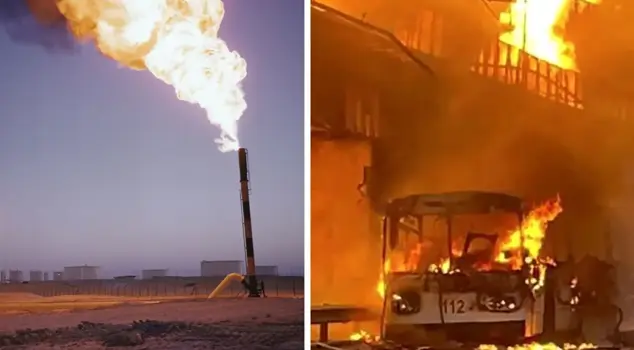
27.11.2024 12:04
Moldova's Energy Minister Victor Parlicov stated at the Istanbul Energy Forum that they expect Turkish companies to invest in energy efficiency for buildings and noted that his country is undergoing a significant transformation in this area. Moldova has also redirected the route for a pipeline that will extend from Russia to Turkey and then to Transnistria.
Moldova's Minister of Energy, Victor Parlicov, stated that his country is undergoing a significant transformation in energy efficiency in buildings, saying, "We will work for several years to improve the energy performance of buildings, and we are expecting Turkish companies to invest in this great transformation opportunity." He answered questions from Anadolu Agency (AA) reporters at the Istanbul Energy Forum, which was held for the first time this year under the theme "Common Future, Common Goals," under the auspices of the Ministry of Energy and Natural Resources.
Parlicov mentioned that Moldova had been dependent on electricity and natural gas imports until recently, explaining that his country is focusing on a major change in efficiency to support energy transformation.
He noted that following the Russia-Ukraine issue, Moldova and Ukraine's electricity systems have been integrated into the European electricity systems, and continued: "We are now developing market-based mechanisms for the electricity and gas markets. Opportunities in Moldova vary in natural gas, electricity, and renewable energy. We are tendering for 105 megawatts of wind energy and 60 megawatts of solar energy. A significant portion of the gas we receive from the European market comes through a vertical corridor from Greece, Bulgaria, and Romania.
INVITATION TO TURKISH COMPANIES TO PARTICIPATE IN TENDERS
Parlicov explained that there is also a significant effort regarding energy efficiency in buildings in Moldova.
Pointing out that there are many different business opportunities aimed at improving the energy performance of buildings, which are primarily construction works, Parlicov stated, "Moldova is undergoing a significant transformation in energy efficiency in buildings. We will work for several years to improve the energy performance of buildings, and we are expecting Turkish companies to invest in this great transformation opportunity. A large market will emerge in this field in Moldova."
On the other hand, Parlicov mentioned that they have initiated tenders for wind and solar energy, adding:
"We know that Turkish companies are interested in both solar and wind energy. We invite Turkish firms to participate in our competitive tender processes. Improving the energy performance of buildings, all kinds of insulation, integrating renewable energies into buildings, and enhancing important technologies like heat pumps provide a lot of work for construction companies. These technologies allow us to reduce costs and emissions."
TURKEY AND MOLDOVA WILL DEVELOP MORE ENERGY PROJECTS
At the Istanbul Energy Forum, Energy and Natural Resources Minister Alparslan Bayraktar and Moldova's Energy Minister Victor Parlicov came together to evaluate alternatives and opportunities regarding natural gas supply.
After the meeting, a memorandum of understanding was signed between the two countries in the field of energy.
The memorandum foresees the sharing of information and experience on topics such as renewable energy, energy efficiency, electricity trading, smart grid technologies, and natural gas supply.
Additionally, it aims to develop joint projects in these areas.
The agreements also support the transfer of information and technology between the two countries, the promotion of investments, and private sector cooperation.
MOLDOVA'S EYES ARE ON TURKEY
Russia and Moldova are experiencing a supply crisis due to the transit gas contract with Ukraine expiring in 2025. The Black Sea country Moldova is seeking alternative routes to continue gas supply to its autonomous region of Transnistria. For this, Turkey is seen as the most efficient route both politically and economically. Moldova, knocking on Ankara's door, is working on a pipeline that will extend from Russia to Turkey and then to Transnistria.
Although a new supply route through Turkey is being considered, this route will not completely bypass Ukraine's gas transportation system. The alternative route, which will bring technical challenges, requires approximately 100 kilometers of transit through Ukrainian territory. This is seen as one of the most significant factors affecting the project's independence from the Kiev administration.